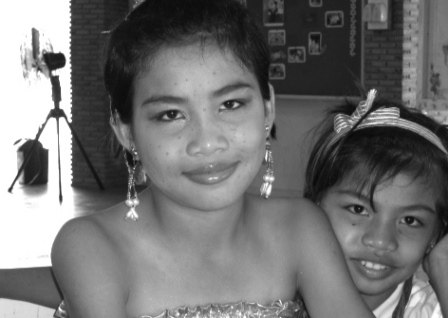Voices: “Living Like a Big Family”
July 2007—The Baan Gerda Orphanage in Lopburi, Thailand, is home to 72 children between the ages of two and fifteen, all but two of them HIV positive. Baan Gerda offers shelter, medical care, and other forms of support for the children, who study at a nearby school along with local children. Almost all of them receive antiretroviral medications (ARVs).
Waree has been the manager of the Baan Gerda Orphanage since it opened six years ago. Tukta is a 13-year-old girl who arrived at the orphanage six years ago with her sister, Tuttu, who is now 9.
Waree: All the children here know what HIV is and they know that it is the reason they have to be at the orphanage. But they don’t know how dangerous HIV is. All have lost one or both of their parents to HIV and were left without proper care. Most of the children here have HIV themselves and their surviving relatives may not wish to take care of them due to health, financial, or personal reasons.
We started administering ARVs to the children at the orphanage the day we opened. This has been very effective in extending their lives. Over the years only six children have died, but all of them were very, very sick when they were brought to the orphanage.

Tukta and her younger sister, Tuttu, now live in the Baan Gerda Orphanage in Lopburi, Thailand. (Photo: Jack (Siam) Arayawongchai) |
Most of the new children here are very young and need a lot of emotional nourishment. When children arrive, I give each one love, comfort, and care. These children need the same emotional connection they would get from a parent. For me, this is more than a job. These kids are my family—and it’s a large family! My hope is that when they grow up they will be able to look after themselves, adapt to living in society, and be happy.
Tukta: Before I came to Baan Gerda Orphanage, my sister, Tuttu, and I lived in our village in Burirun province in northeast Thailand. Our parents died from HIV. Tuttu and I have HIV, too. After they died we stayed with our grandmother but she and our other relatives couldn’t take care of us.
I don’t remember too much about my life before I came because I was just a kid, but it was a difficult time for us. Six years ago, Tuttu and I arrived at the orphanage and we’ve lived here ever since. During the years we’ve been here, our grandmother has visited us only a few times.
I arrived when the orphanage just opened and I was one of the first to live here. There were only a few children that year but we didn’t have any trouble because we learned how to live together with children from different families. The children here love each other and we get along very well, because we live like a big family. When I’m here I like to sing, cook, grow vegetables, and play football.
When we first started going to school, it wasn’t so good. We had a lot of trouble because the other students disliked us—they knew we came from the orphanage, and they would tease us. But now it’s getting better. At school, I represent the class in racing competitions and I like that a lot.
With the assistance of Apinun Sreengam, Noweed Charles, and Stan Wong.